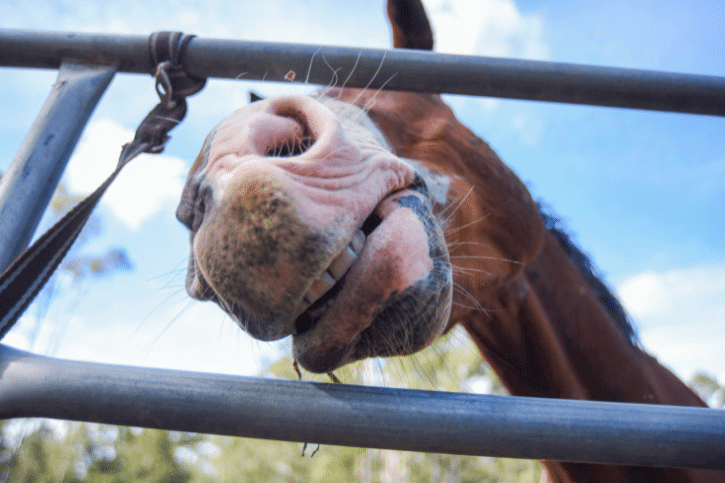How Do Horses Breathe?
A friend and I were having a discussion the other day about how well horses can swim.
Neither of us had ever seen a horse swimming before, so we were really unsure that they were able to do it at all.
We weren’t sure, for one thing, if they’d be able to paddle themselves along or even float.
But the other thing that came up was whether or not, and how well, they’d be able to breathe in water.
We talked at length before realizing we didn’t actually understand how horses breathe at all.
So, we decided to look into it.
So, how do horses breathe?
Horses, unlike us and a lot of other animals, cannot breathe through their mouth. All of their breathing happens through their noses. They are what’s called obligate nasal breathers, which is exactly what it sounds like: they have to use their nose to breathe. When running, they can be heard snorting with each stride.
You might not think it makes that much of a difference, but it does indicate how different a horse’s anatomy really is to our own.
This didn’t really help our debate about swimming much, but nonetheless, let’s look into this question in more detail.
How do horses breathe while running?
As you can imagine, it becomes a lot more difficult to get oxygen to the lungs when the horse is running. 50% harder, in fact.
But they still can only get oxygen through their noses, even when running.
You might be surprised that they’re still such fast runners, and can still run over such long distances, when it’s that difficult for them to get air to their lungs.
Compare our noses with a horse’s, though.
A horse’s entire head is essential a long nasal passage, and their nostrils are proportionally much larger.
If you’ve ever ridden a horse while it was running, you will know that they grunt and snort loudly through their nose as they’re doing so.
Pulling in oxygen exclusively through your nose would seem much more difficult for us, certainly, but for horses their noses and nasal cavities are big enough that it’s easy and natural for them.
One thing people often wonder is how different a horse’s internal respiratory organs are, and if they have a different number of lungs to help with the limited ability to breathe.
Do horses have two lungs?
Yes, horses have two lungs, just like us.
Again, they are proportionally much larger, allowing for a lot more oxygen to enter their bloodstreams.
But they don’t have more than two lungs. Most mammals don’t.
Horses do have a lot of evolutionary traits which accounts for their very large bodies in terms of their respiratory system.
It’s very hard for horses to get blood, and thus oxygen, to the very ends of all of their extremities because they’re such large animals, and their legs are so long.
For example, horses have a frog on the bottom of each hoof; a thick, V-shaped structure on the underside of their hoof which aids in circulation and acts as a shock absorber.
So, horses can comfortably breathe exclusively through their noses without the aid of extra lungs.
How often are they actually breathing, then?
How many times does a horse breathe a minute?
The answer will naturally depend on whether the horse is moving or at rest.
It will also depend on the size, age and breed of the horse.
You’ll need to take all of these things into account.
That said, the average breaths per minute for a horse at rest is somewhere around 8-14 breaths per minute.
For walking, it will be somewhere from 24-36.
For running, it will be anything from 50-80 breaths per minute.
Horses don’t necessarily breathe all that many times then, which indicates to you the volume of each individual breath.
They just need less than the rest of us.
Why do horses yawn?
So, if horses don’t breathe through their mouths, why do they yawn?
Well, the truth is we aren’t exactly sure why anything yawns.
Sure, in us it most commonly indicates fatigue, but can also indicate general boredom.
Why exactly the yawn response happens is not clear—our best guess is that it has something to do with communication.
Horses may not be ‘yawning’ in the same way we do.
It’s most likely a form of communication, a way of indicating certain emotions to other members of the herd.
Despite what you might think, horses usually aren’t conversing with each other when they make noise—they do most of their communication non-orally.
Horse breathing is very dissimilar to a lot of other animals like them.
They are incapable of breathing through their mouths, which you might think limits their ability to respirate efficiently.
But, as we all know, horses have been carrying us around for millennia, and so we can be sure that their breathing is a bit robust than our own.
Either way, horses are obligate nasal breathers—remember that term!
